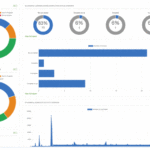How to Minimise Foreign Currency Risk in England
When operating a business in England, it is vital to be aware of the potential risks associated with fluctuations in forex market rates. While many hedging strategies can be used to minimize this risk, it is not always possible to eliminate it.
Use a Foreign Currency Account
One way to reduce your exposure to currency risk is to use a foreign currency account. This type of account allows you to hold and transact in multiple currencies, which can be helpful if you have customers or suppliers in different countries. Foreign currency accounts also offer some protection from exchange rate fluctuations, as you can choose to convert your funds into the local currency at a fixed rate.
Use Forward Contracts
It’s an agreement between two parties to buy or sell an asset at a specified price on a specified date in the future. Forward contracts can hedge against currency risk by locking in an exchange rate for some time. Regardless of what happens to the market, you will know exactly how much your currency is worth.
Use Options
It’s a contract that gives the holder the right, but not the liability, to purchase or sell an asset at a fixed cost on or before a specific date. Options can be used to hedge against currency risk by giving you the flexibility to buy or sell currency at a predetermined rate. Using options can protect you from sudden changes in the market and ensure that you get the best possible price for your currency.
Use Hedging Funds
Hedging funds are investment vehicles that aim to protect investors from losses due to adverse changes in the value of assets. These funds tend to invest in a mix of assets, including stocks, bonds, and currencies, which helps to diversify risk.
Use Currency-linked deposits
Currency-linked deposits are bank accounts where the interest rate is linked to the performance of a specific currency. This type of account can help to hedge against currency risk by providing some protection from exchange rate fluctuations.
Use Foreign Exchange Swaps
A foreign exchange (forex) swap is an agreement between two parties to exchange one currency for another at a set-out rate on a specified date. Swaps can be used to hedge against currency risk by fixing an exchange rate for some time. Regardless of what happens to the market, you will know exactly how much your currency is worth.
Use Currency Futures
A currency future is a contract to buy or sell a specific currency at a fixed cost on a fixed date in the future. Futures can be used to hedge against currency risk by locking in an exchange rate for some time. Regardless of what happens to the market, you will know exactly how much your currency is worth.
Use Currency Options
It’s a contract that gives the holder the right, but not the liability, to buy or sell a particular currency at a specified cost on or before a specific date. Options can be used to hedge against currency risk by giving you the flexibility to buy or sell currency at a predetermined rate. It can protect you from unexpected changes in the market and ensure that you get the best possible price for your currency.
Use Currency ETFs
They are exchange-traded funds that track the movements of a specific currency or group of currencies. These funds can hedge against currency risk by exposing you to various currencies, and this diversification can help protect you from any losses due to fluctuations in any particular currency.
Conclusion
The best strategy for you will depend on your unique circumstances and objectives. However, some of the most common strategies include foreign currency accounts, forward contracts, options, hedging funds, and currency-linked deposits. Using one or more of these strategies can minimize your exposure to currency risk and protect your investment portfolio from losses.











